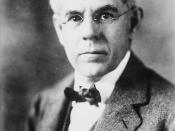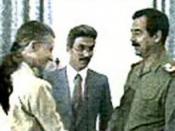Psychology is the science of mind and behavior. Although this is the most accurate definition, it is not the most common. If you were to ask the average person what they think of when someone mentions psychology they would most likely say something like "Lying on a couch, endlessly talking about your mother and your lousy childhood"#. Is the media to blame for this distorted view of psychology and psychologists? The answer to this question is yes. The media's portrayal of psychology is very distorted.
One of the most widely spread forms of media is newspapers. Thousands and thousands of people wake up every morning and start the day off by reading the newspaper. However, it is also one of the biggest problems as far as people's view of psychology. Newspapers are informational but are also entertaining; therefore they want people to be attracted to their articles. Most people don't want to have to spend hours reading one article; they want to be able to find out almost everything that is going on for that day, week, or month within a few moments.
It would take hours to properly portray psychology in a newspaper article so newspapers turn to the shorter version of the explanation. For example in an article found in The Washington Post reverse psychology is portrayed as means for our president to stay positive in the public eye.
Here's an explanation for the anti-Iraq saber-rattling now building in Washington: The Bush administration, though it would dearly love to have Saddam Hussein our of power, has no intention of taking unilateral military action against him. The sword-rattling is designed to make Hussein's military leaders see him as too dangerous for their own good.#
This quote shows us that psychology, more specifically, reverse psychology is just a form of...


